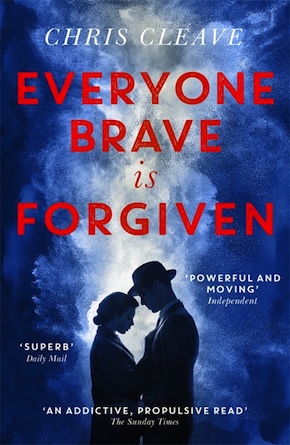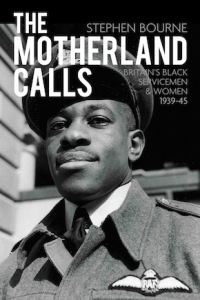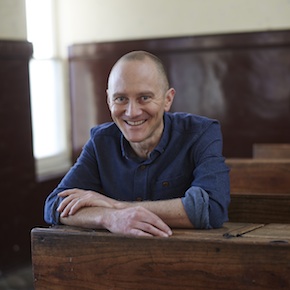Chris Cleave: Across the divide
by Alex Peake-Tomkinson Chris Cleave’s latest novel, Everyone Brave Is Forgiven, is a London-set examination of the real impact of the Second World War, centring on an 18-year-old schoolteacher called Mary North. Cleave and I have tea one afternoon in Piccadilly to discuss it. There’s a reason why we’re drinking tea and not, say, vermouth. Cleave doesn’t drink. How come? “I’ve had two rules as a writer: one is that I would try not to repeat myself and the other is that I won’t go on the sauce. It’s an occupational hazard as a writer: you don’t have a boss, you don’t have anyone pulling you into line the next day and I’ve seen people that I loved really dearly go off the deep end and I just didn’t want to be that person and I felt that it was time to stop. And the fact that it was really hard to stop made me realise the wisdom of that. And now I feel as fresh as a daisy every day, having this immaculate head at 5 am every morning. It’s an amazing luxury. I feel I would never go back but I really enjoyed booze so no regrets, I just feel that I’ve run my course with it.”
Chris Cleave’s latest novel, Everyone Brave Is Forgiven, is a London-set examination of the real impact of the Second World War, centring on an 18-year-old schoolteacher called Mary North. Cleave and I have tea one afternoon in Piccadilly to discuss it. There’s a reason why we’re drinking tea and not, say, vermouth. Cleave doesn’t drink. How come? “I’ve had two rules as a writer: one is that I would try not to repeat myself and the other is that I won’t go on the sauce. It’s an occupational hazard as a writer: you don’t have a boss, you don’t have anyone pulling you into line the next day and I’ve seen people that I loved really dearly go off the deep end and I just didn’t want to be that person and I felt that it was time to stop. And the fact that it was really hard to stop made me realise the wisdom of that. And now I feel as fresh as a daisy every day, having this immaculate head at 5 am every morning. It’s an amazing luxury. I feel I would never go back but I really enjoyed booze so no regrets, I just feel that I’ve run my course with it.”
This opener alerts me to the fact that Cleave is going to offer a fluent response to any conversational titbit I offer. As we’re talking about vices, I take the opportunity to ask him how Mary manages to beat her addiction to morphine. “Well, it’s famously moreish stuff but I think, like most addicts, she reaches a point of self-disgust. If a character like her doesn’t have an inner strength independent of the context in which she finds herself, then she really has no legitimacy as a person. The ethos of the people who considered themselves the ruling class was that they had fibre, a spine – every metaphor that they had for that quality is internal – and if you didn’t have that within you, then you were nothing. She gets back in touch with that inner steeliness.” She’s like a Mitford sister isn’t she, really? “Which Mitford?” Cleave asks, laughing. I don’t think it matters, they’ve all basically got the same sense of humour, I say. “The idea that it’s all a game, that you could take a position over breakfast over whether you would be a fascist or an appeaser or… a libertarian and stick with that for the next thirty years just for kicks, just because your sister didn’t. I like that about Mary.” Surely that’s a luxury of the ruling class? “It remains to this day, the only real distinction between the classes. It’s much more to do with money and choices than it is with breeding. If you have the luxury of time, of not having to go out and thrash yourself to earn that day’s rent then you can take a position based on a hunch, a bet, an intuition, a philosophy, an ideology rather than having all your choices be forced and I think that’s why you have a certain responsibility to people who aren’t in that position. I feel like that’s what all my writing is about. I think it’s all about class and trying to see it from both sides. What does it look like to have no choice, what does it look like to have every single day present itself as a set of obligations versus the opposite? All of my books have this dichotomy in them where you try to find a sympathetic angle in characters on both sides of that divide. The rich aren’t evil and the poor aren’t slovenly, it’s just these accidents of birth and if we can reach across those divides then we can fix a lot of what is broken about our society now because the same faultlines exist today.”
If you have the luxury of time, you can take a position based on a hunch, a bet, an intuition, a philosophy, an ideology rather than having all your choices be forced.”
But back to the genesis of Everyone Brave Is Forgiven. Cleave has said that the novel was prompted by finding the letters his maternal grandfather wrote to his fiancée during World War II. “It started with talking to him, really, he opened my eyes to the idea that that generation is more complex than we tend to give them credit for. We have this idea that they were very brave and stoical, almost affectless, just very clipped… we have this very sort of chiselled view of the 1940s which was informed by films like Mrs Miniver and I don’t think they were like that at all. I realised that from talking to my grandfather, who I think was a very representative junior officer. He was as funny as anything and as complex as anything. And then I read his letters to my grandmother and my grandmother’s letters to him and they were nuanced, subtle, funny, and they felt as though they could have been written now. I found them so interesting and the whole generation came alive for me.”
Cleave goes on “They weren’t brave to begin with, they weren’t united to begin with. When the policy became one of engagement with Hitler rather than appeasement of Hitler, that was really controversial and split the country right down the middle in the late 1930s just in the same ways that Brexit does now. There was this slow process where people united and decided to fight the war even when they thought it hadn’t been a good idea. I found it interesting to examine this idea that people were scared in the beginning and became brave as they went along. This is something that my grandfather said, that courage isn’t something we’re born with, it’s a muscle that develops as you use it. It’s something we misremember about that generation: they’re just like us and there’s a danger in putting them on a pedestal. I think we’re capable of all their bravery and stoicism and of course we could do it again. In fact, we could do it better because we’ve made a lot of progress in other areas. We’re more diverse, more tolerant than they were. What frustrates me now is not how bad it is but how good it is!”
 Talking of the progress our society has made, I feel compelled to ask Cleave about the racism suffered by black characters in the book, notably a 10-year-old boy called Zachary who is hideously bullied when he’s evacuated out of London. There’s also a widespread use of racial epithets which Cleave has addressed elsewhere. I tell him how unpalatable I found the racism. “Yes, it was really unexpected. I found there were 10,000 black families living in London at the outbreak of the war. I didn’t know that, they’ve been whitewashed out of history. 10,000 more came to join them, to fight for what they called the ‘mother country’, and they were met with nothing but racism and hostility. There was a colour bar so they weren’t allowed to join the army. It’s the same now: refugees are stung by this kind of double libel: they aren’t allowed to work but they get pilloried for not working. And this was the case with these people who came to help with the war effort. They were lambasted. There were examples of black families being kicked out of air raid shelters during live raids because white families didn’t fancy sharing space with them. Having discovered that, it would be really weird if I didn’t then write that in. I would be making the choice as a writer to also whitewash that out of my book and I just didn’t want to, I thought it was time we wrote a truer story about this period.”
Talking of the progress our society has made, I feel compelled to ask Cleave about the racism suffered by black characters in the book, notably a 10-year-old boy called Zachary who is hideously bullied when he’s evacuated out of London. There’s also a widespread use of racial epithets which Cleave has addressed elsewhere. I tell him how unpalatable I found the racism. “Yes, it was really unexpected. I found there were 10,000 black families living in London at the outbreak of the war. I didn’t know that, they’ve been whitewashed out of history. 10,000 more came to join them, to fight for what they called the ‘mother country’, and they were met with nothing but racism and hostility. There was a colour bar so they weren’t allowed to join the army. It’s the same now: refugees are stung by this kind of double libel: they aren’t allowed to work but they get pilloried for not working. And this was the case with these people who came to help with the war effort. They were lambasted. There were examples of black families being kicked out of air raid shelters during live raids because white families didn’t fancy sharing space with them. Having discovered that, it would be really weird if I didn’t then write that in. I would be making the choice as a writer to also whitewash that out of my book and I just didn’t want to, I thought it was time we wrote a truer story about this period.”
Our conversation thus far has been more politically charged than I’d anticipated, but I detour briefly to ask Cleave if he meant to write about the sky so often! Of course there were air raids going on so the sky is relevant, but these huge vistas also give us a sense of how small the characters are. Was that conscious?
“Thanks for noticing! And I hadn’t noticed, until I finished the book. There is a scene though, when there’s a snowstorm and the bombing stops for a few nights. Finally, everyone can get some sleep, finally they can make choices and not just run for cover. There are these three or four days and that signals the end of one relationship in the book because the two people have enough time to think about it. They look up into the sky and there’s this snowstorm and they realise that there’s this great swirling vortex of it all over Europe. Every rule of civilisation was inverted by war, so in that context there was nothing more welcome than a paralysing snowstorm!”
I’ve never liked any of the characters to be informed only by their context. I like them to be the authors of their own misfortune.”
But back to politics, did Cleave have a political intent with this book?
“Definitely, yes.” “I’m glad you’re owning up to it,” I say, laughing with relief. Cleave appears slightly startled by this but calmly explains, “I’ve never felt reading should be a punishment or a lecture but if you’re not trying to reveal a worldview in your work, then it just belongs on the entertainment stack and that’s a deep stack but I’ve always quietly been trying to make a point and I don’t think it’s a political one, I think it’s a human one, saying here are these faultlines in society.
“In this book, I’m deliberately going back to a period that people romanticise, that they eulogise… there’s a sort of false nostalgia about the war and our current generation of politicians fall over each other to be ‘Churchillian’ or to evoke the spirit of our finest hour, especially post-Brexit. You get all these chumps lining up to say “We didn’t fight the Second World War so that we could be told what to do by Germany!” People really do say that but Europe was actually Churchill’s idea! Both my grandfathers came back from the war thinking that stronger European integration would be a very good idea! I’ve never liked any of the characters to be informed only by their context. I like them to be the authors of their own misfortune.”
Does that mean they ever do things you don’t want them to? He takes a deep breath. “Yeah they do, all the time! I write about people because I’m slow to understand people and I think the reason I started writing novels was trying to make sense of human reactions because they’re not logical. It used to really frustrate me sometimes: you know someone really well and you know what they want to do because you know the way they will respond but then they do something completely different, which used to infuriate me but now it charms me, now I’m the opposite. The most boring people are the ones who do exactly what you expect them to do based on your previous observations of them. I find sometimes that if you write a character in quite a lot of psychological depth, you do understand logically what they would do and you also get an intuition into the times when they would do something a bit wild. The characters will occasionally want to do that… It sounds like bullshit and yet I’ve come to believe it happens – and that the novel is bigger than the writer.”
We talk about the nature of trauma, something Cleave writes about beautifully in this novel. “I was in a car crash once that was really bad,” he says, “and it’s very interesting how your brain plays so many different tricks. It doesn’t want what has happened to have happened and therefore it plays you a completely different movie so therefore it takes a long time for people in reality to convince you that what they are saying is real. Everyone who has been traumatised is mad, absolutely mad. It drives you mad.”
There is only one scene of violence in the book and Cleave explains to me how hard it was to write it.
“I think as a writer you go to places so that your readers don’t have to and you spend a long time there. I don’t think it’s an art, it’s a craft, and I don’t think we’re very bright. I think we write because we’re dumb and we’re slow to understand people. The service we offer is that we spend an unhealthy amount of time in dark places so that you don’t have to.”
I thank him for his time and this willingness to stay in the dark. “All part of the service ma’am,” he laughs.
 Chris Cleave’s earlier novels Incendiary, The Other Hand (a.k.a. Little Bee) and Gold are bestsellers published in thirty languages, and have been adapted for screen and stage worldwide. He is a regular newspaper and broadcast contributor to the cultural debate on parenting, literature and human rights. Everyone Brave Is Forgiven is out now in paperback from Sceptre.
Chris Cleave’s earlier novels Incendiary, The Other Hand (a.k.a. Little Bee) and Gold are bestsellers published in thirty languages, and have been adapted for screen and stage worldwide. He is a regular newspaper and broadcast contributor to the cultural debate on parenting, literature and human rights. Everyone Brave Is Forgiven is out now in paperback from Sceptre.
Read more.
chriscleave.com
@chriscleave
Author portrait © Paul Stuart
Alex Peake-Tomkinson is a contributing editor at Bookanista and writes book reviews and features for the Mail on Sunday, the TLS and 1843 magazine.
@AlexPeakeTom

